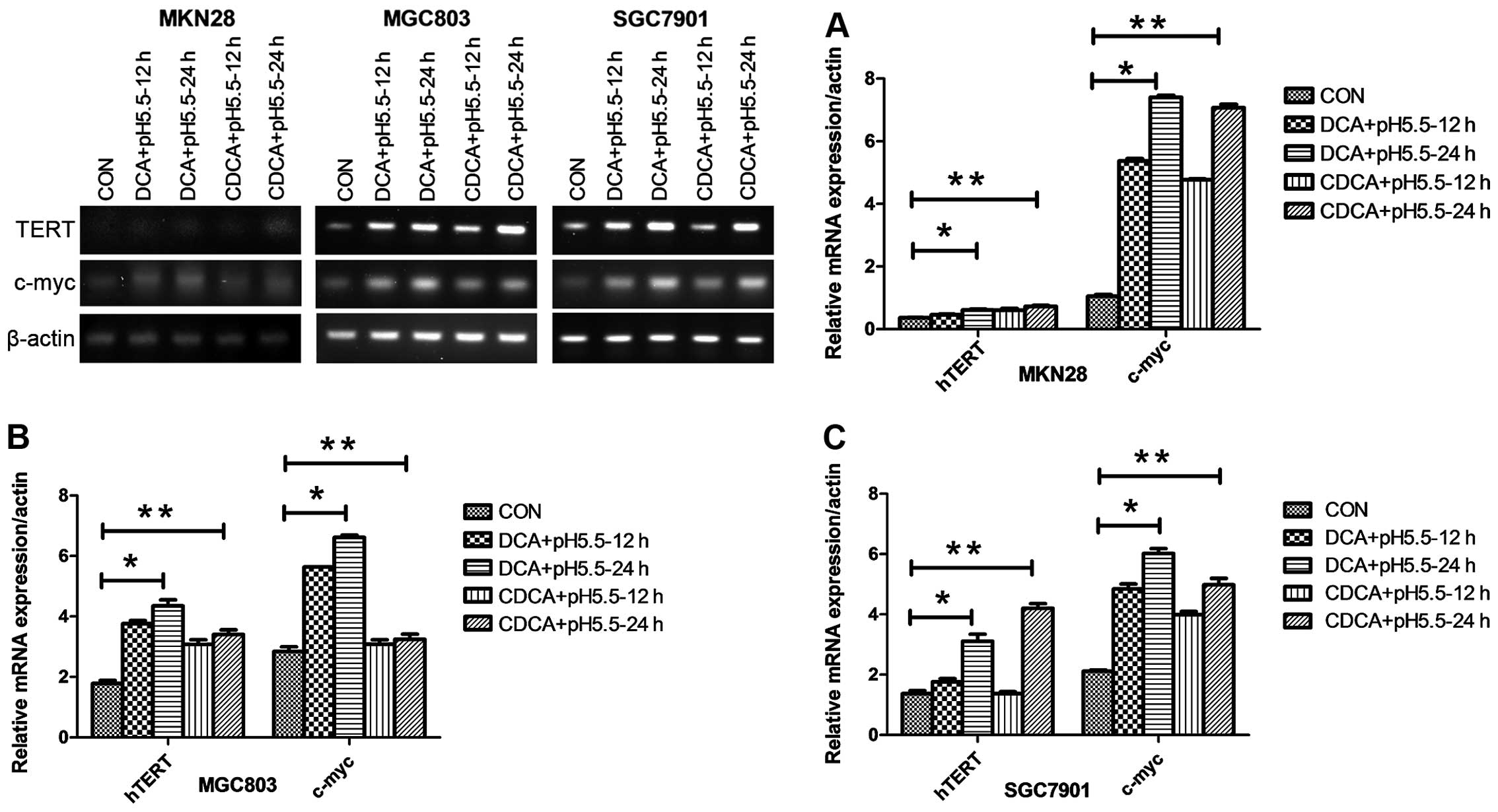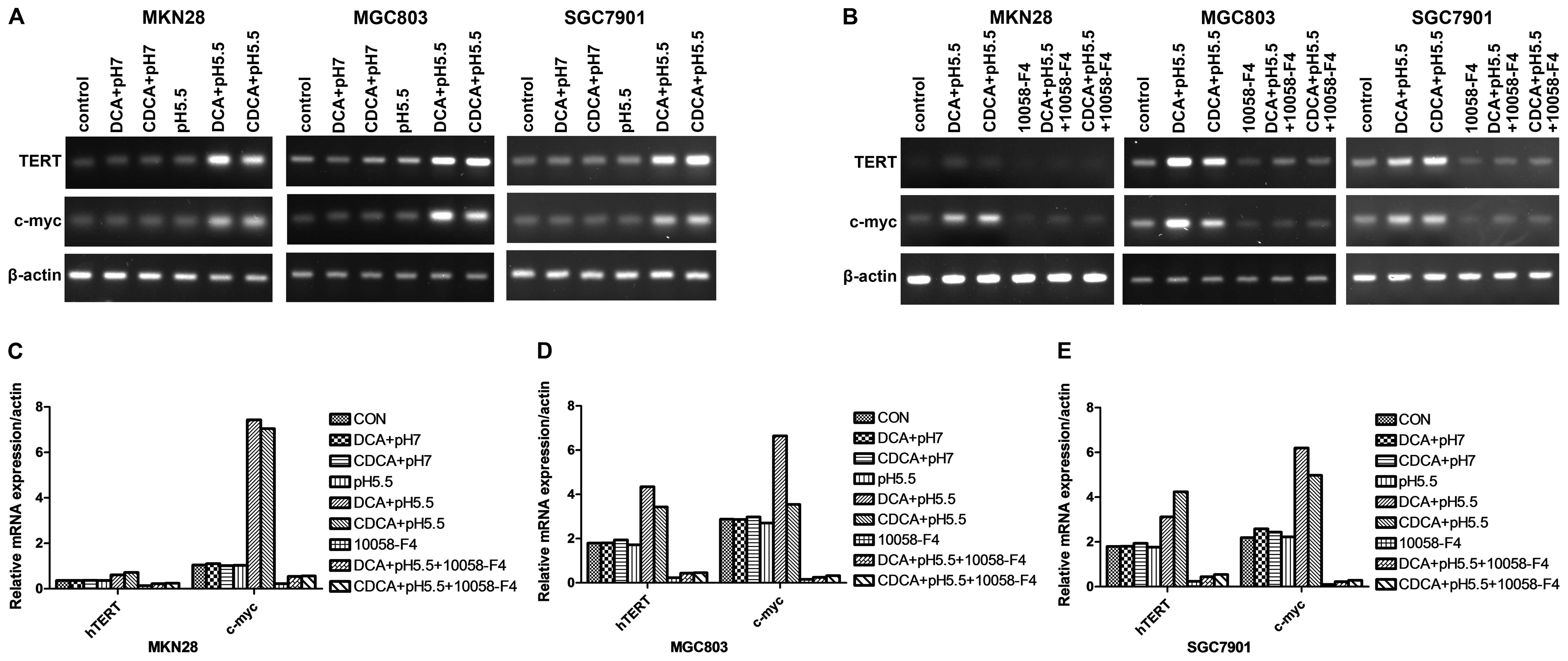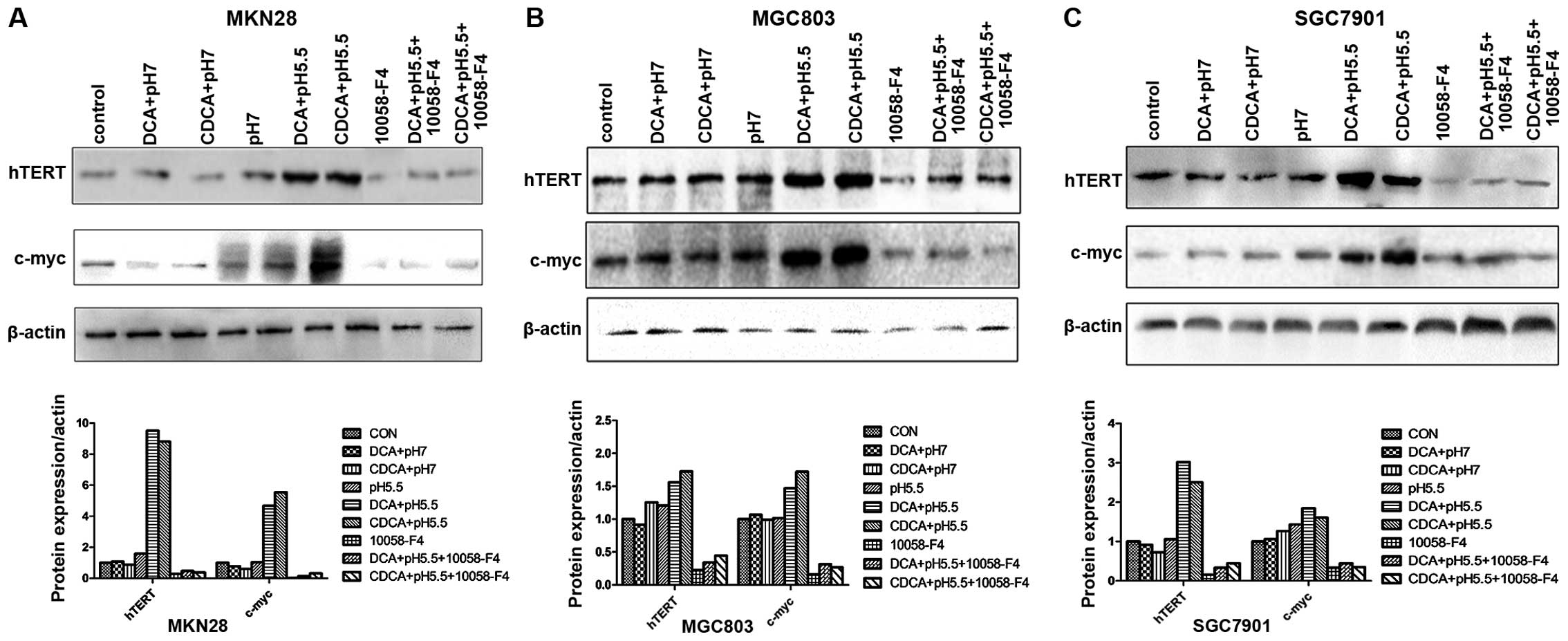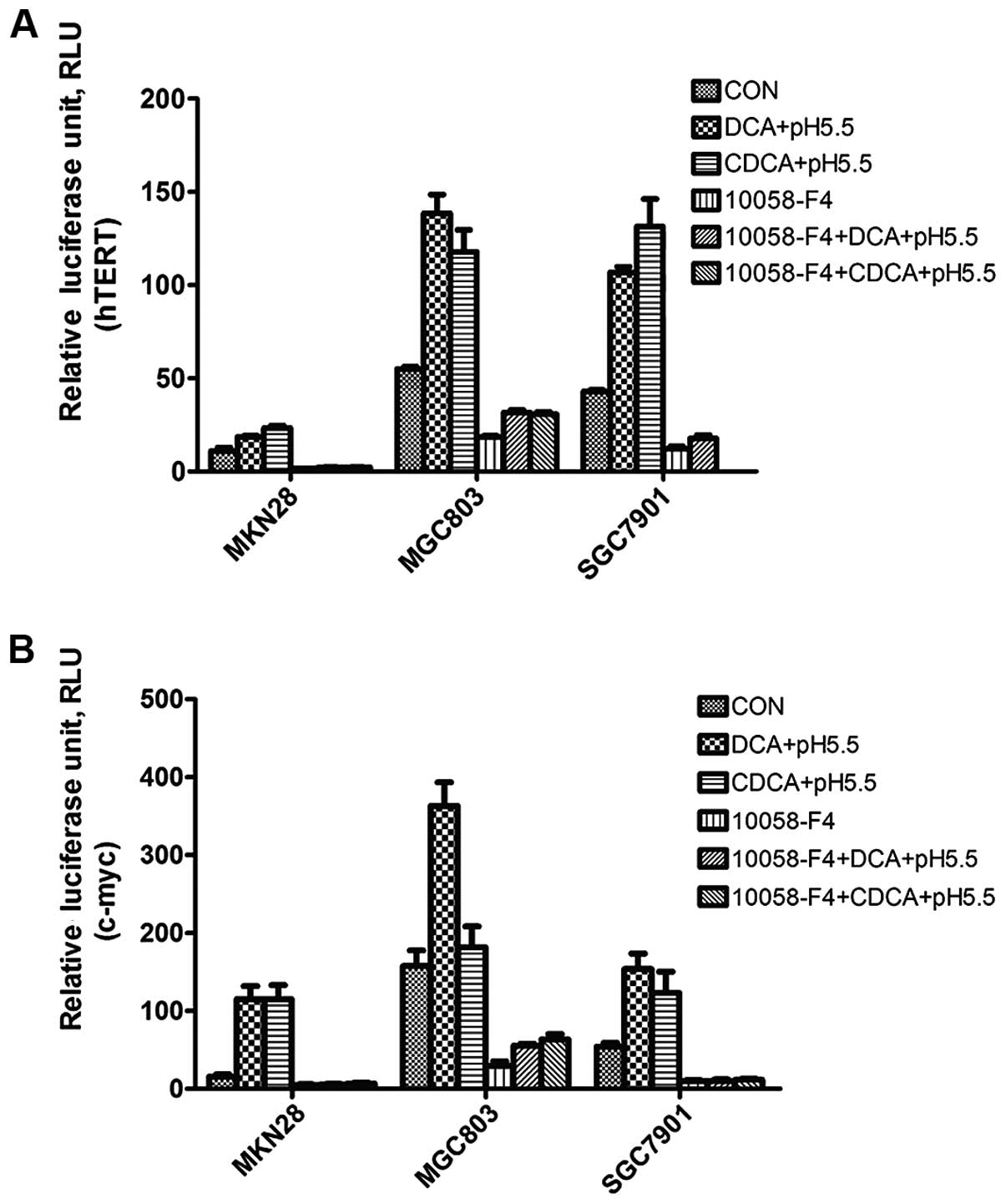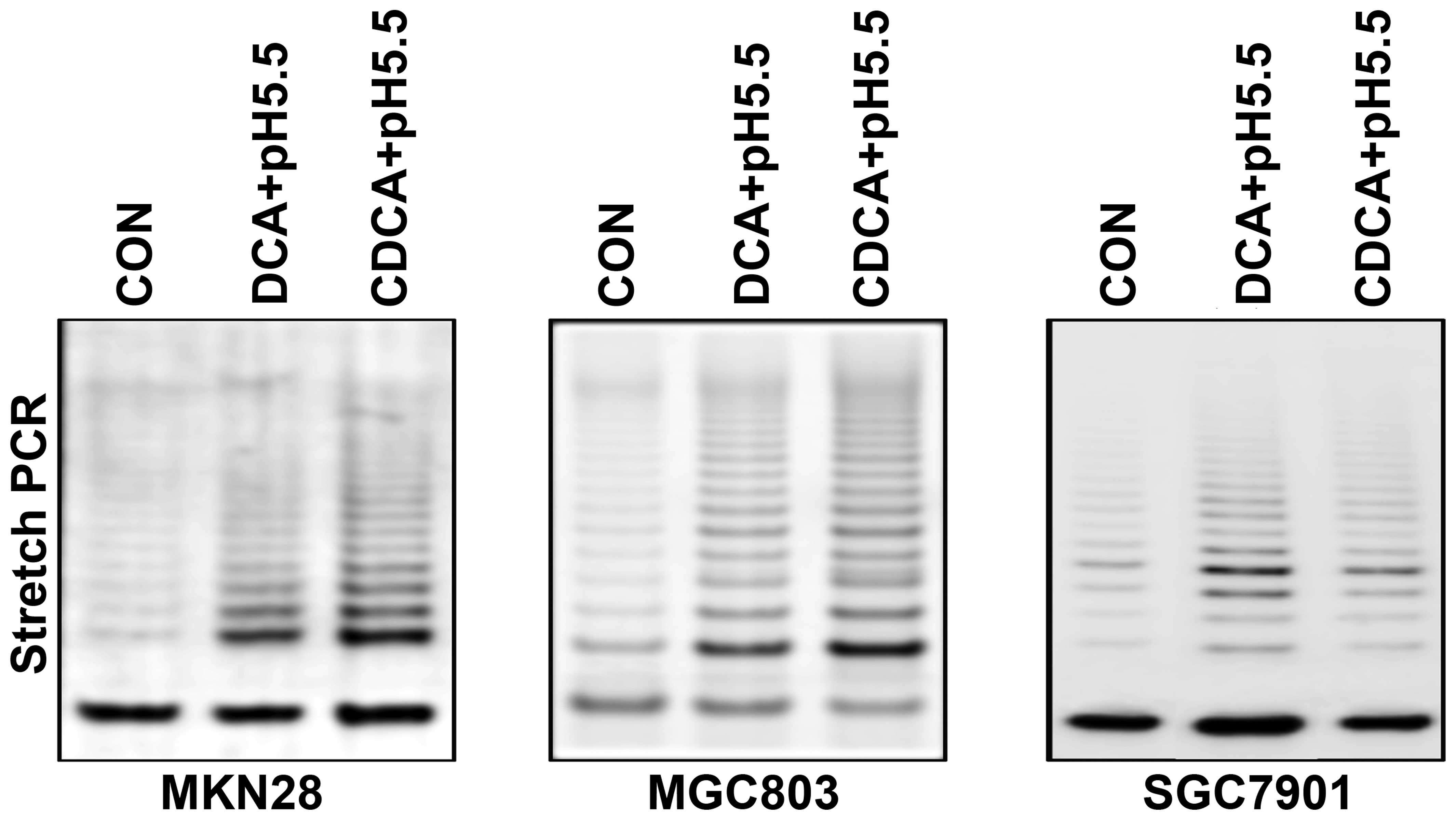|
1
|
Feng J, Funk WD, Wang SS, Weinrich SL,
Avilion AA, Chiu CP, Adams RR, Chang E, Allsopp RC, Yu J, et al:
The RNA component of human telomerase. Science. 269:1236–1241.
1995. View Article : Google Scholar : PubMed/NCBI
|
|
2
|
Greider CW: Telomerase activity, cell
proliferation, and cancer. Proc Natl Acad Sci USA. 95:90–92. 1998.
View Article : Google Scholar : PubMed/NCBI
|
|
3
|
George J, Banik NL and Ray SK: Knockdown
of hTERT and concurrent treatment with interferon-gamma inhibited
proliferation and invasion of human glioblastoma cell lines. Int J
Biochem Cell Biol. 42:1164–1173. 2010. View Article : Google Scholar : PubMed/NCBI
|
|
4
|
Cerni C: Telomeres, telomerase, and myc.
An update Mutat Res. 462:31–47. 2000. View Article : Google Scholar
|
|
5
|
Zhang F, Altorki NK, Wu Y, Soslow RA,
Subbaramaiah K and Dannenberg AJ: Duodenal reflux induces
cyclooxygenase-2 in the esophageal mucosa of rats: evidence for
involvement of bile acids. Gastroenterology. 121:1391–1399. 2001.
View Article : Google Scholar : PubMed/NCBI
|
|
6
|
Goldman A, Chen HD, Roesly HB, Hill KA,
Tome ME, Dvorak B, Bernstein H and Dvorak K: Characterization of
squamous esophageal cells resistant to bile acids at acidic pH:
implication for Barrett’s esophagus pathogenesis. Am J Physiol
Gastrointest Liver Physiol. 300:G292–G302. 2011. View Article : Google Scholar
|
|
7
|
Tatsugami M, Ito M, Tanaka S, Yoshihara M,
Matsui H, Haruma K and Chayama K: Bile acid promotes intestinal
metaplasia and gastric carcinogenesis. Cancer Epidemiol Biomarkers
Prev. 21:2101–2107. 2012. View Article : Google Scholar : PubMed/NCBI
|
|
8
|
Kauer WK, Peters JH, DeMeester TR, Ireland
AP, Bremner CG and Hagen JA: Mixed reflux of gastric and duodenal
juices is more harmful to the esophagus than gastric juice alone.
The need for surgical therapy re-emphasized. Ann Surg. 222:525–533.
1995. View Article : Google Scholar : PubMed/NCBI
|
|
9
|
Yen CJ, Izzo JG, Lee DF, Guha S, Wei Y, Wu
TT, Chen CT, Kuo HP, Hsu JM and Sun HL: Bile acid exposure
up-regulates tuberous sclerosis complex 1/mammalian target of
rapamycin pathway in Barrett’s-associated esophageal
adenocarcinoma. Cancer Res. 68:2632–2640. 2008. View Article : Google Scholar : PubMed/NCBI
|
|
10
|
Jenkins GJ, Cronin J, Alhamdani A, Rawat
N, D’Souza F, Thomas T, Eltahir Z, Griffths AP and Baxter JN: The
bile acid deoxycholic acid has a non-linear dose response for DNA
damage and possibly NF-κB activation in oesophageal cells, with a
mechanism of action involving ROS. Mutagenesis. 23:399–405. 2008.
View Article : Google Scholar : PubMed/NCBI
|
|
11
|
Tselepis C, Morris CD, Wakelin D, Hardy R,
Perry I, Luong QT, Harper E, Harrison R, Attwood SE and Jankowski
JA: Upregulation of the oncogene c-myc in Barrett’s adenocarcinoma:
induction of c-myc by acidified bile acid in vitro. Gut.
52:174–180. 2003. View Article : Google Scholar : PubMed/NCBI
|
|
12
|
Greenberg RA, O’Hagan RC, Deng H, Xiao Q,
Hann SR, Adams RR, Lichtsteiner S, Chin L, Morin GB and DePinho RA:
Telomerase reverse transcriptase gene is a direct target of c-Myc
but is not functionally equivalent in cellular transformation.
Oncogene. 18:1219–1226. 1999. View Article : Google Scholar : PubMed/NCBI
|
|
13
|
Horikawa I, Chiang YJ, Patterson T,
Feigenbaum L, Leem SH, Michishita E, Larionov V, Hodes RJ and
Barrett JC: Differential cis-regulation of human versus mouse TERT
gene expression in vivo: identification of a human-specific
repressive element. Proc Natl Acad Sci USA. 102:18437–18442. 2005.
View Article : Google Scholar : PubMed/NCBI
|
|
14
|
Wang C, Mayer JA, Mazumdar A, Fertuck K,
Kim H, Brown M and Brown PH: Estrogen induces c-myc gene expression
via an upstream enhancer activated by the estrogen receptor and the
AP-1 transcription factor. Mol Endocrinol. 25:1527–1538. 2011.
View Article : Google Scholar : PubMed/NCBI
|
|
15
|
He TC, Sparks AB, Rago C, Hermeking H,
Zawel L, da Costa LT, Morin PJ, Vogelstein B and Kinzler KW:
Identification of c-MYC as a target of the APC pathway. Science.
281:1509–1512. 1998. View Article : Google Scholar : PubMed/NCBI
|
|
16
|
Hoshi S, Takahashi T, Satoh M, Numahata K,
Suzuki K, Ohyama C, Mori M, Mituoka T, Nakagawara K and Orikasa S:
Telomerase activity. Urol Oncol. 5:25–30. 2000. View Article : Google Scholar : PubMed/NCBI
|
|
17
|
Tomizawa A, Kanno SI, Osanai Y, Yomogida S
and Ishikawa M: Cytotoxic effects of caffeic acid undecyl ester are
involved in the inhibition of telomerase activity in NAlM-6 human B
cell leukemia cells. Oncol Lett. 6:875–877. 2013.PubMed/NCBI
|
|
18
|
Hasegawa T, Chosa N, Asakawa T, Yoshimura
Y, Ishisaki A and Tanaka M: Establishment of immortalized human
periodontal ligament cells derived from deciduous teeth. Int J Mol
Med. 26:701–705. 2010. View Article : Google Scholar : PubMed/NCBI
|
|
19
|
Lin CP, Liu JD, Chow JM, Liu CR and Liu
HE: Small-molecule c-Myc inhibitor, 10058-F4, inhibits
proliferation, downregulates human telomerase reverse transcriptase
and enhances chemosensitivity in human hepatocellular carcinoma
cells. Anticancer Drugs. 18:161–170. 2007. View Article : Google Scholar
|
|
20
|
Huang M, Cheng Y, Liu C, Lin S and Liu HE:
A small-molecule c-Myc inhibitor, 10058-F4, induces cell-cycle
arrest, apoptosis, and myeloid differentiation of human acute
myeloid leukemia. Exp Hematol. 34:1480–1489. 2006. View Article : Google Scholar : PubMed/NCBI
|
|
21
|
Debruyne PR, Bruyneel EA, Li X, Zimber A,
Gespach C and Mareel MM: The role of bile acids in carcinogenesis.
Mutat Res. 480–481:359–369. 2001. View Article : Google Scholar
|
|
22
|
Bajpai M, Kessel R, Bhagat T, Nischal S,
Yu Y, Verma A and Das KM: High resolution integrative analysis
reveals widespread genetic and epigenetic changes after chronic in
vitro acid and bile exposure in Barretts epithelium cells. Genes
Chromosomes Cancer. 52:1123–1132. 2013. View Article : Google Scholar : PubMed/NCBI
|
|
23
|
Miwa K, Hasegawa H, Fujimura T, Matsumoto
H, Miyata R, Kosaka T, Miyazaki I and Hattori T: Duodenal reflux
through the pylorus induces gastric adenocarcinoma in the rat.
Carcinogenesis. 13:2313–2316. 1992. View Article : Google Scholar : PubMed/NCBI
|
|
24
|
Dixon MF, Mapstone NP, Neville PM,
Moayyedi P and Axon AT: Bile reflux gastritis and intestinal
metaplasia at the cardia. Gut. 51:351–355. 2002. View Article : Google Scholar : PubMed/NCBI
|
|
25
|
Nakayama J, Tahara H, Tahara E, Saito M,
Ito K, Nakamura H, Nakanishi T, Tahara E, Ide T and Ishikawa F:
Telomerase activation by hTRT in human normal fibroblasts and
hepatocellular carcinomas. Nat Genet. 18:65–68. 1998. View Article : Google Scholar : PubMed/NCBI
|
|
26
|
Li C, Hsiao Y, Wu T, Lin Y, Yeh K and Ko
J: Vorinostat, SAHA, represses telomerase activity via epigenetic
regulation of telomerase reverse transcriptase in non-small cell
lung cancer cells. J Cell Biochem. 112:3044–3053. 2011. View Article : Google Scholar : PubMed/NCBI
|
|
27
|
Bodnar AG, Ouellette M, Frolkis M, Holt
SE, Chiu CP, Morin GB, Harley CB, Shay JW, Lichtsteiner S and
Wright WE: Extension of life-span by introduction of telomerase
into normal human cells. Science. 279:349–352. 1998. View Article : Google Scholar : PubMed/NCBI
|
|
28
|
Pelengaris S, Rudolph B and Littlewood T:
Action of Myc in vivo - proliferation and apoptosis. Curr Opin
Genet Dev. 10:100–105. 2000. View Article : Google Scholar
|
|
29
|
Wu KJ, Grandori C, Amacker M, Simon-Vermot
N, Polack A, Lingner J and Dalla-Favera R: Direct activation of
TERT transcription by c-MYC. Nat Genet. 21:220–224. 1999.
View Article : Google Scholar : PubMed/NCBI
|
|
30
|
Takakura M, Kyo S, Inoue M, Wright WE and
Shay JW: Function of AP-1 in transcription of the telomerase
reverse transcriptase gene (TERT) in human and mouse cells. Mol
Cell Biol. 25:8037–8043. 2005. View Article : Google Scholar : PubMed/NCBI
|















